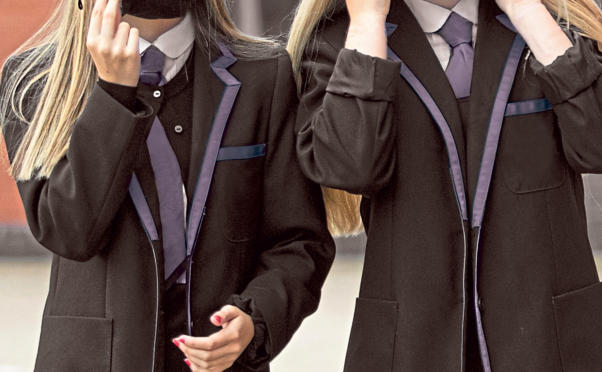
One in five teenage girls has been sexually assaulted and three out of five have endured some form of harassment, according to a survey laying bare a crisis of consent in Scotland’s schools.
Only 19% of schoolgirls have not endured abuse or harassment or know someone who has, according to interviews.
The survey, carried out for The Post, reveals the appalling abuse suffered by girls and young women and prompted calls for urgent action to transform how children are taught about relationships and sex and to curb access to online pornography.
Almost 70% of the girls and young women interviewed do not believe the scale of the crisis is understood while nearly 80% say more must be done to curb harassment.
The survey comes after an online platform received accounts of sexual harassment from schools around the UK, including 105 in Scotland. Soma Sara, who launched the Everyone’s Invited website, said today’s survey is both dismaying and a clarion call for action.
She said: “These figures are shocking but, sadly, are also a reflection of what we are seeing from the people coming forward to tell us of their experiences.
“We know from those who have shared their stories that many have tried to describe what had happened to them but felt they were not believed by their teachers, their family or their friends. The effect of not being believed can be just as isolating and painful as the actual assault itself which is why so many suffered secondary traumatisation.”
What is hugely significant is that for the first time, young people are the ones taking the lead on this issue by speaking up and showing just how normalised sexualised violence has become.
Our poll, conducted by polling firm Panelbase, who interviewed 450 girls and young women, with, where appropriate, their parents’ consent, reveals 18% had been sexually assaulted, 17% had been stalked and 14% had been targeted with indecent exposure. While under the age of 18, 62% personally experienced harassment.
Over half, 55%, were targeted physically, and over a third, 34%, had been touched inappropriately.
In a clarion call for action, 69% of those surveyed said there was not enough understanding of the scale of the crisis, while 79% said not enough was being done to curb sexual harassment and abuse. Only 38% of girls under 18 had suffered no form of sexual abuse or harassment, although almost half of them knew a girl who had.
Dr Patrick Road, general secretary of the NASUWT teachers’ union, said: “Whether it is at school, on the street or online, young women are being exposed to sexual violence which is constraining their right to live freely and safely.
“We know that too often young women are conditioned to accept such abuse as part of normal life or to expect that if they do report it nothing will be done.”
He said Scotland’s schools need to tackle the problem but cannot do so alone. He added: “Schools need to be supported to focus their actions on creating a climate and culture where sexual harassment or sexual abuse, whether on-site or online, are not tolerated.
“Education about consent, healthy relationships and understanding what abuse looks like and the impact it can have are all vital elements of creating such a culture change.”
Social science and health expert Dr Karen Lorimer, of Glasgow Caledonian University, has been part of research into how sex education in Scotland’s schools has evolved and believes more must be done.
She said: “I welcome the attention being brought to this, as it is devastating to think what young girls are being subjected to. Unfortunately, too many will recognise the awful truth of these figures.
“Colleagues and I explored learning about sex from a multi-generational perspective. The importance, but inadequacy, of school as a source of learning, was a persistent theme over time.
“Whilst school is an important source of information, and we should be pressing for mandatory good-quality sexual health and relationships education, it is not the only source.”
She said schools can only do so much when our society is laden with sexist and misogynistic attitudes that damage men as well as women and must be challenged.
“Some of the disturbing behaviour the poll highlighted should not simply be dismissed as harassment when in fact it is much more serious. It is stalking and it should be dealt with as stalking.”
Stuart Allardyce, director of child protection charity Stop It Now! Scotland, said: “The number of young people sharing their experiences of peer sexual abuse is extremely concerning but unfortunately not surprising. Around one third of child sexual abuse is carried out by other under-18s, and the online world brings more opportunities for harm.
“The level of adolescent sexual violence is a huge problem and one of the main reasons behind it is that both boys and girls get some of their education about sex from online pornography, including some of their first experiences. We work with young men who have offended sexually and we see the way their attitudes and values are being shaped by pornography, which can be very damaging.
“Children need good, accurate information about consent, healthy relationships and realistic ideas about what normal bodies look like and what sex is, to challenge what they learn from pornography. They need to get this information in age-appropriate ways at all levels as they go through the school curriculum.
“But this can’t just be one more job for teachers, education staff need full support so that they can help children in the best way possible, including to spot and respond to any signs of harm. Stop It Now! Scotland is working closely with Education Scotland to roll out a national programme to improve the responses to online harmful sexual behaviour in schools and colleges.”
Ann Moulds, of Action Against Stalking, warned parents would be deeply concerned about the findings and said: “This poll clearly highlights the desperate need for safeguarding and government action.”
Scottish Labour’s Shadow Minister for Children and Young People and former teacher Martin Whitfield said: “Parents will be shocked by the results of this poll, which show it’s highly likely there isn’t a child who hasn’t been affected. And if it isn’t involving your child, then it’s involving the child of someone you know.
“We need to find a far more effective way of supporting children to speak up and play a role in educating and protecting each other, whether its ensuring there’s a safe place for them to go and talk about their own experiences or report something they see, we have to listen to them and put them at the heart of everything we do to tackle this issue.”
Scottish Conservative shadow minister for children and young people, Meghan Gallacher said: “Our young people need to be educated better about how to respectively interact with each other. These are formative years, and by leaving aggressive behaviour unaddressed it could lead to greater issues in the future.”
The Scottish Government said there is no place for harassment or abuse of any form in society, in schools, workplaces or homes.
It added: “We are determined to ensure children receive high-quality relationships, sexual health and parenthood education in schools as an integral part of the health and wellbeing of the school curriculum in Scotland. Through our Equally Safe delivery plan and review of Personal and Social Education we are taking action aimed at preventing sexual harassment and gender-based violence, in order to develop positive relationships amongst children and young people.
“We are committed to explore whether further actions beyond those already planned, including guidance for schools, are required.
“We will also commission an independent review to establish positive practice and further areas for improvement, during this parliamentary session.”
Harassment was everyday. It felt normal
Katie Horsburgh, 21, from Edinburgh, represents Girlguiding Scotland on the First Minister’s National Advisory Council On Women And Girls
Sexual harassment was everywhere at our high school. There were always boys shouting horrible things at you.
Boys would compare the size of your chest or comment on parts of your body.
It even happened in front of teachers who didn’t step in too often to stop it. But they were sometimes victim to that same kind of behaviour, so I don’t necessarily blame them. They often haven’t had the training on how to support young people with this.
Verbal abuse escalated to inappropriate touching, boys trying to grab you or touch you under the desk or back you into a cupboard. It happened to most girls.
I remember one girl who suffered a horrible sexual assault. The boy who did it filmed what happened and shared it around the school. I know the girl was really distressed. It was so traumatic for her.
If nothing is done to tackle incidents like that, girls grow up learning that’s what happens. It normalises it, and that’s wrong.
We have the opportunity to break cycles like that in school. We need to teach equality and values and enact them.
But it happened so often it almost began to feel like it was normal.
We understood it was wrong. But there was a reluctance from a lot of girls to formally report it, because nobody wanted to be seen to be doing that.
Sexual violence is a symptom of the type of society we live in.
We need to change the culture.
It’s incredibly hard to speak about this
Amy O’Brien, 21, lives in Glasgow
There was a girl at school who faced constant comments on the size of her chest. We were only second or third year, but already girls were being sexualised. I remember thinking, “Oh I don’t like that, that doesn’t feel right” but it felt almost normalised so I wasn’t confident enough to speak up or say anything.
At 13 or 14, you’re just starting to be introduced to what’s acceptable, and it’s easy to be fooled into thinking that was just how people talk when they are attracted to someone.
Myself and another girl went to our year head to complain about a boy who had been making inappropriate comments about us. We were made to feel we were overreacting. I’ve had more conversations about sex and relationships with friends as an adult than I ever did in school. That should be one of the things young men and women are taught about, but our sex education was inadequate.
Kids aren’t speaking to their parents as it feels like something you can’t talk about. That barrier is the problem, if you can’t talk about sexist behaviour, how do you expect it to change?
I had instances in both school and college when I was harassed, but I had to just brush it off. It’s easy to say we should speak out, but if you’ve never been supported to feel safe to share your experiences, it’s incredibly hard.
I couldn’t tell mum. I couldn’t tell anyone
Now 23, Shona, not her real name, is from the Highlands but now lives in Glasgow
When I was in first year, a girl in the year above had naked pictures leaked. She was about 13. She was ostracised by everyone, and even though I don’t think many people saw the photos, everyone knew about it and everyone was talking about her.
The general feeling was that it was her fault for taking the photos and, of course, the boy who shared them faced no repercussions.
Then, just a few years later, the same thing happened to me. I was in a relationship with a boy a few years older than me, and I felt pressured into sending him intimate photos.
I thought I could trust him, but when we broke up he showed the photos to other people, and soon I was the one being ostracised. I ended up taking a month off school, giving my mum every excuse in the book not to attend classes. I didn’t feel like I could tell her what happened, and I definitely didn’t feel like I could tell a teacher.
I didn’t even talk to my friends about it. I pretended the whole thing wasn’t happening and put on a brave face. I thought if I pretended I didn’t care it would die down quicker. Looking back, I know that experience traumatised me. It was only very recently, as an adult, that I finally felt comfortable and confident enough to be in relationships and be intimate again.
Our sex education really was woefully inadequate. Classes consisted of putting a condom on a banana, before we were told about the risks of unprotected sex and teen pregnancy. That was it.

Enjoy the convenience of having The Sunday Post delivered as a digital ePaper straight to your smartphone, tablet or computer.
Subscribe for only £5.49 a month and enjoy all the benefits of the printed paper as a digital replica.
Subscribe

